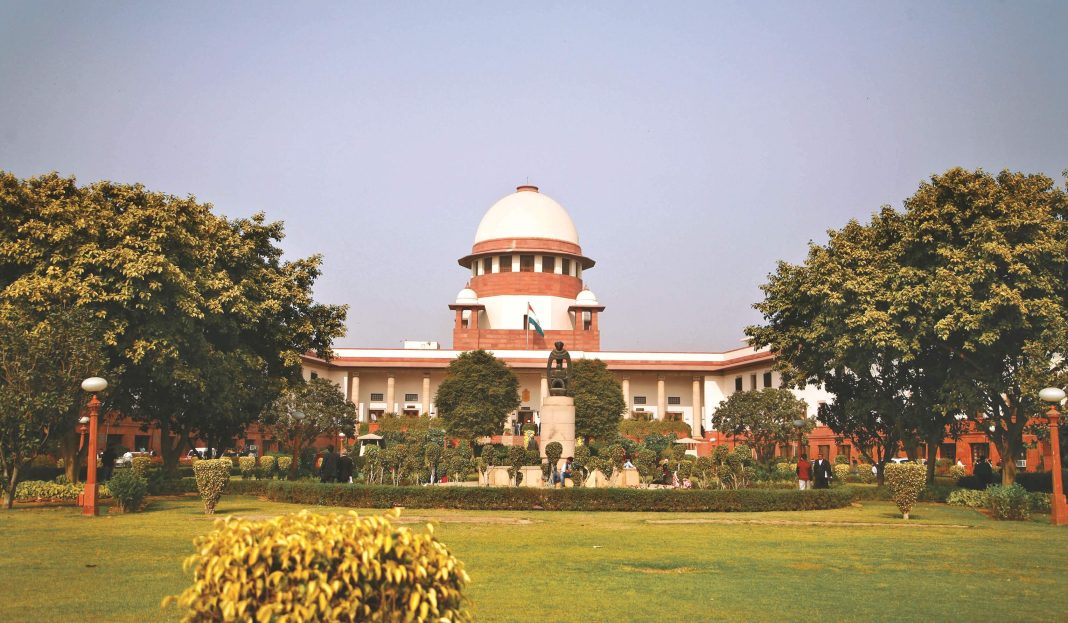The Supreme Court has orally observed that Article 35A of the Constitution, which came to be repealed in 2019, was one which effectively took away the fundamental rights of non-residents of Jammu and Kashmir (J&K).
A Constitution Bench comprising Chief Justice of India (CJI) DY Chandrachud along with Justice Sanjay Kishan Kaul, Justice Sanjiv Khanna, Justice BR Gavai and Justice Surya Kant said that Article 35A conferred special rights on the people of Jammu and Kashmir.
However, it also curtailed three fundamental rights of persons domiciled in the rest of the India.
The CJI said that by enacting Article 35A, the fundamental rights of non-residents of Jammu and Kashmir were virtually taken off.
The bench added that what was taken away was employment under the State government, so there were special rights for residents and (that was) taken away for non-residents.
These include equality in government employment under Article 16(1), right to acquire immovable property under Article 19 (1)(f)and Article 31 and right settlement in the State which was a fundamental right under 19(1)(e).
Talking about Article 35A, which was abrogated in 2019 along with Article 370, the Apex Court said that it empowered the Jammu and Kashmir (J&K) legislature to define ‘permanent residents’ of the State and provide special rights and privileges to them in terms of public employment, immovable property and settlement.
The SG argued that Article 35A was created in the Constitution of India only to apply to J&K.
He contended that with the removal of Article 35A (along with the abrogation of Article 370), investment and tourism have received a boost in the region.
Monday was the 11th day of hearing in the petitions challenging the Central government’s move in August 2019 that resulted in revocation of the special status of Jammu and Kashmir (J&K). The erstwhile State was bifurcated into two Union Territories.
The Supreme Court yesterday also asked the Central government to ascertain the reason behind suspension of a senior lecturer of the School Education Department in J&K, Dr. Zahoor Ahmad Bhat, who had appeared in the matter for the petitioners.
During the hearing, the CJI asked the Central government about replacing the word ‘constituent assembly’ with ‘state legislature’ by way of amendment to Article 368 through a presidential order which enabled the abrogation of Article 370.
“The point you have tried to make that constituent assembly of J&K was legislative assembly and not constituent assembly, that may not be correct since Article 238 brought subjects under the fold of the State only after constituent assembly approval. So calling it merely a legislative assembly may not be correct.”
The SG replied saying that Article 370 was a self-extinguishing legislation.
He said whenever a word in Article 370 became otiose, it was replaced like Sadr-e -Riyasat was replaced by Governor. Article 370 was a self-extinguishing provision. During subsequent parliamentary proceedings also, Article 370 was treated as a temporary one.
SG Mehta added that earlier, the Jammu & Kashmir (and Ladakh) High Court judges would take their oath on the Constitution of J&K, though they were discharging duties under the Constitution of India.
He then argued that all four Constitutional orders regarding abrogation were passed during the President’s rule, which has gone on without there being any legal challenge to the same.
Sibal responded to the same by saying that if a certain thing is not challenged in a PIL then the constitutionality of it cannot be adjudged?
He said when it is said that the Governor should not have dissolved, then it becomes a political argument. He asked as to how could that pre-empt his submission.
He then refuted allegations of a sinister design behind the abrogation of Article 370.
As per the SG, whenever presidential proclamation was issued, proviso to Article 356 was suspended in each and every case.
He said he has studied all such proclamations in all States, not just Jammu and Kashmir. It is being said that as if the Centre did something surreptitiously, as if the government had some sinister plan!
Proviso to Article 3 is always suspended and it has nothing to do with committing fraud on the Constitution of India. A lot of things happened, Pulwama happened in early 2019, and it was done thinking a lot of things in mind such as the sovereignty, national security issues etc in mind.
The SG stressed that whenever there is President’s rule, the parliament exercises the role of the State legislature.
The CJI then asked that if the powers of legislature of state under 356B can be exercised by parliament then what is the Constitutional necessity of suspending the proviso to Article 3?
He said they were dealing with a case where legislature was dissolved. What if it is kept in suspended animation, it can meet and pass a law.
Justice Khanna then pointed out that as a matter of convention, whenever a State government is dissolved, the proviso to Article 3 is also suspended.
Justice Khanna also pointed out that Article 356 has a cap of three years after being evoked in a State, a deadline which has exceeded with respect to J&K.


